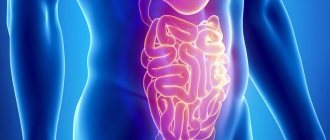Causes of diarrhea with pancreatitis
Doctors note that in acute pancreatitis, patients usually suffer from constipation. Diarrhea most often occurs in the chronic form.
The reasons are as follows:
- Insufficient amount of digestive enzymes.
- Exacerbation of other chronic diseases, for example, inflammation of the bladder or bile ducts.
- Impaired intestinal motility.
- Dysbacteriosis is the displacement of normal intestinal microflora by opportunistic microorganisms.
- Pancreatitis, which is a consequence of alcoholism.
Risk factors
Risk factors for diarrhea with pancreatitis are as follows:
- Pathologies of the abdominal organs of a viral, bacterial and parasitic nature, provoking a violation of the intestinal microflora.
- Vascular diseases that affect the kinetic function of the digestive organs.
- Injury to the pancreas due to impact, injury or surgery.
- Diseases of the gallbladder, liver, biliary tract, including the presence of stones.
- Use of strong medications and allergies to medications.
Pathogenesis
Pancreatitis is a very dangerous progressive inflammation, which, if left untreated, can cause serious disturbances in the digestive process and affect almost all organs and systems.
The pathogenesis of diarrhea in pancreatitis is based on a decrease in the enzymatic function of the pancreas. Due to insufficient production of enzymes, there is a shortage of them in the duodenum, and as a result, the entire digestion process suffers.
What is pancreatitis?
One of the most common progressive diseases of the gastrointestinal tract is pancreatitis. The enzymes produced by the pancreas should normally enter the duodenum.
With the development of pathology, they are activated in the gland, starting the process of self-digestion. In advanced cases, the disease leads to irreversible disruption of the digestive system. If enzymes and toxic substances enter the blood, they damage other organ systems: cardiovascular, nervous, respiratory, urinary.
As a rule, foci of inflammation in the pancreas arise as a result of bad habits. The most common cause of pancreatitis is long-term abuse of alcoholic beverages. Smoking takes second place, because nicotine has a detrimental effect on almost all human organ systems.
In addition, factors that increase the risk of developing the disease are:
- regular overeating;
- abuse of protein diet;
- long-term use of medications (antibiotics, contraceptives, diuretics).
The disease can occur in acute and chronic form. The acute form occurs as a result of cytomegalovirus, hepatitis B and C, helminthiasis, bile duct dyskinesia, perforated duodenal ulcer, intestinal infarction, chronic and acute cholecystitis, stone disease localized in the gallbladder.
Ineffective treatment entails the degeneration of acute pancreatitis into chronic. In this case, acute pain, constant constipation, yellowness of the skin are replaced by periodic abdominal pain after eating or on an empty stomach. Pancreatic diarrhea is also a typical sign of the chronic form of the disease. In the initial stages of pancreatitis, the patient may complain of bloating and a feeling of pressure on the left side, but diarrhea occurs only with severe overeating.
In advanced cases, the frequency of digestive disorders increases, as a result, the performance of the entire body decreases. In addition, symptoms such as nausea, vomiting, severe abdominal cramps, as well as dizziness and weakness due to dehydration appear.
Very rarely, pancreatitis develops on its own. It is diagnosed together with inflammatory pathologies of the digestive tract or infectious lesions of the peritoneal organs.
Symptoms
Disturbances in the digestive system are the main symptoms of pancreatitis. Diarrhea makes itself felt with loose, mushy stools. Most often, the urge to have a bowel movement occurs some time after eating.
Diarrhea with pancreatitis is characterized by the following symptoms:
- Repeated bowel movements.
- Polyfecality - large volumes of feces.
- Light or grayish stool.
- Feces may not be easily cleared from the walls of the toilet.
- Presence of fat and shine in feces.
- Unpleasant smell.
- Leftover undigested food.
Yellowish, creamy stool is typical for patients who have been treated with antibiotics. But this may also indicate the development of related diseases, for example, disorders of bile secretion, pathologies of the liver and biliary tract.
As the situation worsens, other symptoms appear, such as dehydration, weight loss, lack of valuable components in the body, anemia, deterioration of hair, skin, and nails. Stress and psychological problems are also common.
Normalization of stool with diet
Abnormal bowel movements occur due to various factors, this can be the treatment of diseases using medications that affect the functioning of the gastrointestinal tract, improperly balanced foods, substances that can affect the digestion process and a number of diseases that manifest themselves in the same way. Doctors advise that in case of intestinal problems, adhere to certain rules and advice, as well as a special diet that will help normalize the situation with stool.
The rules themselves are not difficult to implement; the main thing is not to neglect or ignore them.
- The daily dose of water should be at least 2 liters, but it can also be another liquid, for example unsweetened dried fruit compote. Water or other moisture will help cleanse and remove any remaining substances that cause diarrhea from the intestines.
- Light regular walks and simple physical exercises must be present in the daily schedule.
- Eat foods containing fibers of natural origin: bran, cereals, dried fruits, which, like a sponge, will clean everything unnecessary from the surface of the intestinal walls.
- Ban eating shortly before bedtime.
- Do not eat a lot of food at one time: often a lack of enzymes negatively affects the digestion process.
- Rich broths, fried, smoked, salted and other foods are difficult for the stomach to accept; until normal functioning of the gastrointestinal tract is restored, it is advisable not to eat such products temporarily.
- In order to improve the situation, use a light abdominal massage, this will have a positive effect on the functioning of peristalsis.
The products that experts advise using for organizing dietary meals are easy to digest, have beneficial properties and are enriched with microelements and vitamins necessary for the body. When eating food, you need to do it slowly, and the dishes themselves should have a small dosage. Among the food products for restoring stool, you should pay attention to those that will help you do this in the shortest possible time:
- Products are rich in fiber, most of them are vegetables and herbs.
- Lactic acid products contain material for restoring beneficial microflora in the gastrointestinal tract.
- Natural honey.
- Flaxseed oil, this substance is a good remedy for constipation.
- Fresh juice, warm still water, dried fruit compote.
- Low-fat varieties of fish and meat.
Treatment of pancreatic loose stools
Pancreatitis is a complex disease that constantly negatively affects the functioning of the gastrointestinal tract and one of such manifestations is diarrhea. Treatment problems with stool are eliminated in three main ways:
- With the help of medications.
- The use of folk remedies.
- Using diet.
You can also use complex treatment, sometimes this method will give the fastest result with the least side effects.
How to treat with drugs
Any treatment that involves the use of medications requires consultation with a specialist, and given the complexity of the disease, which includes pancreatitis, it is advisable to do this regularly. Pancreatitis is an insidious disease, and its manifestation in the form of diarrhea is one of the main inconveniences that occurs against the background of inflammatory processes of the pancreas. Treatment of diarrhea is necessary not only because it is inconvenient, but also because of the dangerous effects on the body if left untreated:
- CNS disorders.
- Due to weakening, the body is practically not protected against other diseases.
- Metabolic disorders in the body.
- Sudden weight loss caused by dehydration.
- Vitamin deficiency, which causes necrosis of some organs.
When treating diarrhea due to pancreatitis, two types of drug treatment are suggested:
- Orally. For this purpose, preparations containing enzymes and bacteria are used to help the pancreas work: “Pancreatin”, “Bifidumbacterin”, “Creon”, “Lakatobacterin”.
- Drugs for intravenous administration. This type of medication is used by medical professionals in a hospital setting to treat an acute illness. For this purpose, preparations containing electrolyte salts in the form of solutions are used - “Trisol”, “Disol”, etc.
The drugs popular among the people have a good effect: “Mezim”, “Festal”, “Pangrol”, “Loperamide”; specialists purchase them, so to speak, in reserve when a symptom manifests itself suddenly and at the most inopportune time.
Complications and consequences
Regardless of the cause of diarrhea, the most serious consequence is dehydration. The color, type and smell of the discharge does not matter; it is enough that it becomes more liquid, and accordingly, the volume of water in it increases.
During the act of defecation during diarrhea, the body loses 2-3 times more water than usual. Considering that with prolonged pancreatitis, diarrhea is possible several times a day, fluid loss can be critical. It manifests itself as constant thirst and dry skin.
Along with water, necessary substances leave the body, which leads to disruption of the water-electric balance. Digestion and intestinal absorption are impaired, anemia, lack of protein and vitamins, and metabolic disorders are possible. The body's protective functions are reduced. Also, diarrhea with pancreatitis can provoke necrosis of organs with the development of their dystrophy.
In addition, frequent urge to defecate can worsen the patient’s quality of life and limit his ability to function normally. The consequence of this is depression and nervous disorders, which aggravate the course of the disease.
Fighting dehydration
Everyone knows that frequent diarrhea leads to severe dehydration. If a patient with pancreatitis has had more than 10 bowel movements, this is a reason for urgent hospitalization. In a hospital setting, the patient is given intravenous Magnesium, Sodium and Potassium. If necessary, other electrolyte salts may be prescribed.
If doctors see no reason to hospitalize the patient, then in this case they recommend drinking plenty of fluids. The patient needs to drink at least 2 liters of water.
Important! Don't count drinks and tea. A patient with such a disease and profuse diarrhea should drink only boiled water.
Diagnostics
Diarrhea with pancreatitis most often indicates that the disease is becoming chronic. The sooner you see a doctor, the better. If inflammation of the pancreas is suspected, diagnosis includes examination with palpation of the epigastric region, study of symptoms, and sometimes temperature measurement.
The following tests are prescribed:
- general blood analysis;
- blood test for glucose;
- general urine analysis;
- stool analysis.
Also, if pancreatitis is suspected, laboratory diagnostics of the functioning of the pancreas is performed. For this purpose, a special urine or blood test for enzymes is prescribed.
Instrumental diagnostics makes it possible to assess the size of organs and the processes that occur in them. Ultrasound of the pancreas remains the most informative and popular diagnostic method. More modern techniques are computed tomography and magnetic resonance imaging, which make it possible to examine the pancreas in as much detail as possible.
Differential diagnosis
Differential diagnosis is carried out with inflammation of the gastrointestinal tract (gastritis, colitis, duodenitis), intestinal infections, and intoxications.
Type and features
In case of pancreatitis, examining stool and observing its shape, color, and consistency allows you to more accurately determine the course of the disease and prescribe the correct treatment. The digestion process as a result of inflammation of the pancreas and disruption of the enzymatic function of the organ is manifested by increased gas formation, bloating, and stomach pain. The frequency of bowel movements, shape and color of stool vary depending on the severity of the disease.
Determination of the type of stool in pancreatitis is often carried out using the Bristol scale of stool forms. The following types are distinguished:
- Feces are separate hard lumps, nut-shaped (difficult to pass);
- Sausage-shaped feces with cracks on the surface;
- Feces are sausage- or snake-shaped, with a smooth surface and soft consistency;
- Feces are soft lumps with straight ends (easily passable);
- The feces have the structure of loose flakes with uneven ends, the stool is mushy;
- The masses released during emptying have a liquid consistency and do not include solid particles. Feces are completely liquid.
When pancreatitis is recorded:
- Feces containing mucus. The presence of a small amount of mucus is not considered a deviation from the norm. Mucus is necessary for the transport of feces. With pancreatitis, the increase in the amount of mucus can be of different percentages. If abundant traces of mucus are recorded on the walls of the toilet, this is an alarming signal about the progression of the disease.
The appearance of mucus in the stool indicates increased enzymatic activity. Excessive mucus secretion appears as a result of pathological conditions in which the organs of the digestive tract try to neutralize the substance that negatively affects their condition with an excessive amount of mucus, through liquefaction and evacuation together with feces. In this way, the body gets rid of processing residues during the digestion process to prevent the development of inflammation in the organs.
Excessive mucus in the stool can be a harbinger of other pathologies. A diagnosis can be made after a thorough examination by a specialist.
- Traces of blood in the stool. Traces of blood in the feces during pancreatitis appear in the presence of neoplasms in the organs of the digestive tract, as well as as a result of the appearance of cracks and tears in the walls of the colon. Blood in the stool may be a sign of bleeding areas in the digestive system, as well as an exacerbation of acute pancreatitis.
To determine the cause of the appearance of blood in feces, laboratory and instrumental examinations are carried out, which makes it possible to clarify the density of blood clots, the color of the substance, and the presence of other symptoms. Until the cause is determined, the doctor recommends not using coarse and difficult-to-digest foods in the diet. Consumption of fatty, spicy, salty, sour, smoked foods and fast foods is prohibited.
The peculiarity of the excretion of feces with traces of blood are the symptoms that accompany the disease:
- General weakness;
- Nausea;
- A sharp decrease in blood pressure;
- Pain during bowel movement;
- Pronounced intensity of discharge.
Treatment of diarrhea with pancreatitis
The peculiarity of diarrhea with pancreatitis is that it is not so easy to stop.
Consolidating medications alone may not be enough. To eliminate diarrhea, stabilization of the pancreas is necessary. To relieve attacks of pancreatitis at the first time of exacerbation, it is recommended to fast a little and drink water. Ice compresses are applied to the pancreatic area to relieve swelling and inflammation. Also, during exacerbation, bed rest is indicated. It is worth sticking to a gentle diet. Enzymatic preparations, enterosorbents are prescribed; in the presence of pain, analgesics, as well as probiotics that help restore the intestinal microflora.
Medicines for diarrhea with pancreatitis
To treat diarrhea, you must first of all normalize the digestive process. Replacement therapy involves the constant use of enzymatic medications that help eliminate diarrhea and prevent other complications. The most popular of them is Creon. It is created on the basis of pork pancreatin, which is identical in properties to human pancreatin. The dosage is determined individually.
Another drug is Festal. It is combined and, in addition to pancreatin, includes other enzymes that help the body digest food quickly and efficiently. Demonstrates good effectiveness in the treatment of diarrhea due to pancreatitis and cholecystitis.
Enzymatic medications are prescribed for chronic pancreatitis at the stage of remission.
If diarrhea is regular and poses a health threat, a specialist may prescribe fixatives.
A popular antidiarrheal drug is Immodium. It is based on loperamide, which reduces the production of mucus in the intestines and improves the absorption of liquids in the digestive tract.
Diarrhea and pancreatitis are often accompanied by pain in the intestines and pancreas. Then the specialist can prescribe antispasmodics and painkillers, such as Spazmil. This is a complex drug that is both an antispasmodic and an analgesic.
Video on the topic: Constant diarrhea. Cause and effect.
Traditional treatment
Traditional methods can be a good addition to basic therapy. Most often, medicinal plants are used to help eliminate inflammation, reduce pain and improve digestion.
Fresh carrot and potato juices have a good effect. You need to squeeze the juice from well-washed peeled vegetables. It is recommended to mix juices in equal proportions and drink a glass three times a day. Decoctions of walnut leaves, horse sorrel, and pomegranate peels help to cope with diarrhea.
You can use chamomile infusion: pour a tablespoon of the raw material into a glass of boiling water and drink half a glass three times a day. You can also supplement chamomile with calendula and corn silk. A tablespoon of this collection is poured into a glass of boiling water, allowed to brew for about an hour in a warm place and consumed 15 minutes before a meal for a course of one month.
Wormwood and immortelle also help with diarrhea. Pour a tablespoon of any herb into a glass of boiling water, let immortelle brew for half an hour, and wormwood for 45 minutes.
Immortelle is taken in the amount of half a glass three times a day. You need to be careful with wormwood, as it is very poisonous. Its decoction is drunk in small portions - 2 tablespoons, five times a day.
Choleretic preparations also help improve digestion during pancreatitis:
- You need to take 20 g each of celandine, knotweed, dandelion root and tricolor violet. Pour the raw material with a liter of water and boil for three minutes. Use three times a day before meals for a course of two weeks. After completing the course of taking the first collection, you can switch to the second.
- Take 60 g of mint and dill seeds, 40 g of hawthorn and immortelle fruits and 20 g of chamomile. Pour the composition with a liter of boiling water and let it brew until it cools down. Take three times after meals for four weeks.
It is important to understand that folk remedies do not replace medications prescribed by a doctor, they only complement their effect. In addition, before taking any of them, you should consult a specialist.
Homeopathy
There are several homeopathic medicines that also effectively help fight such an unpleasant phenomenon as diarrhea due to pancreatitis:
- Arsenicum. An arsenic-based remedy prescribed for frequent and loose stools, accompanied by pain and vomiting.
- Yodum. An iodine preparation that normalizes stool in pancreatitis.
- Drugs such as Momordica, Colocint, compositum (for intravenous administration) help cope with diarrhea and pain in the intestines.
- Chelidonium-homaccord N. Helps with pancreatitis occurring against the background of cholelithiasis.
For any type of diarrhea, medications such as Belladonna and Aloe help. A remedy such as Argenticum nitricum is prescribed only if the stool contains remnants of undigested food.
Although homeopathic remedies are considered safe, you should not take them without consulting a specialist.
Prevention
Diarrhea with pancreatitis indicates that the pathology continues to develop, being chronic, and the pancreas cannot fully function, which affects the entire digestion process. Therefore, they treat, first of all, not diarrhea, but the pancreas, which is affected by inflammation.
The same goes for prevention. The following measures will help prevent pancreatitis and diarrhea as one of its symptoms:
- To refuse from bad habits.
- Eat right, don't overeat. Avoid fried, salty, spicy, fast food and other unhealthy foods.
- Control your weight and activity.
- Regularly undergo examinations with a gastroenterologist and follow his recommendations.











